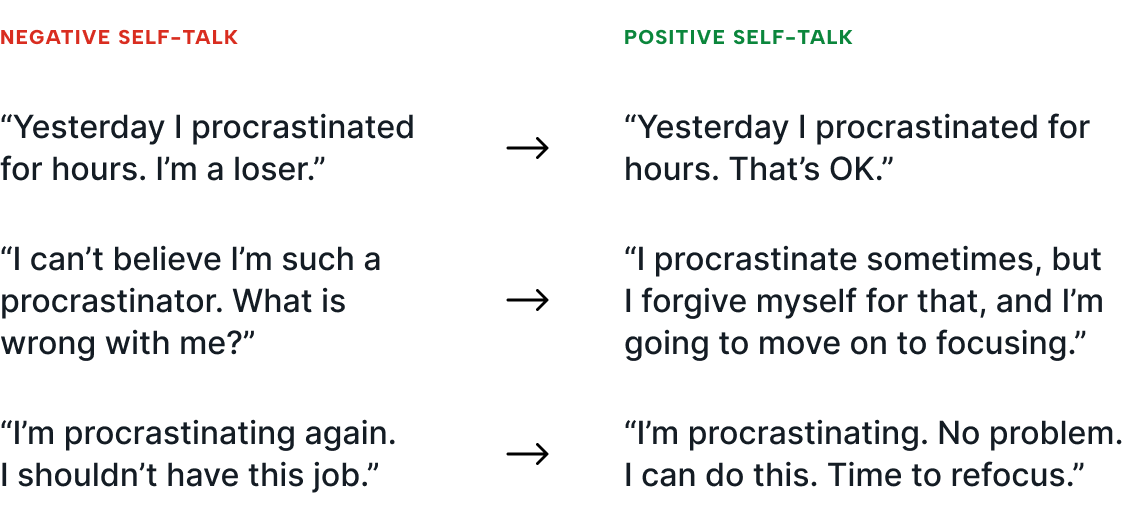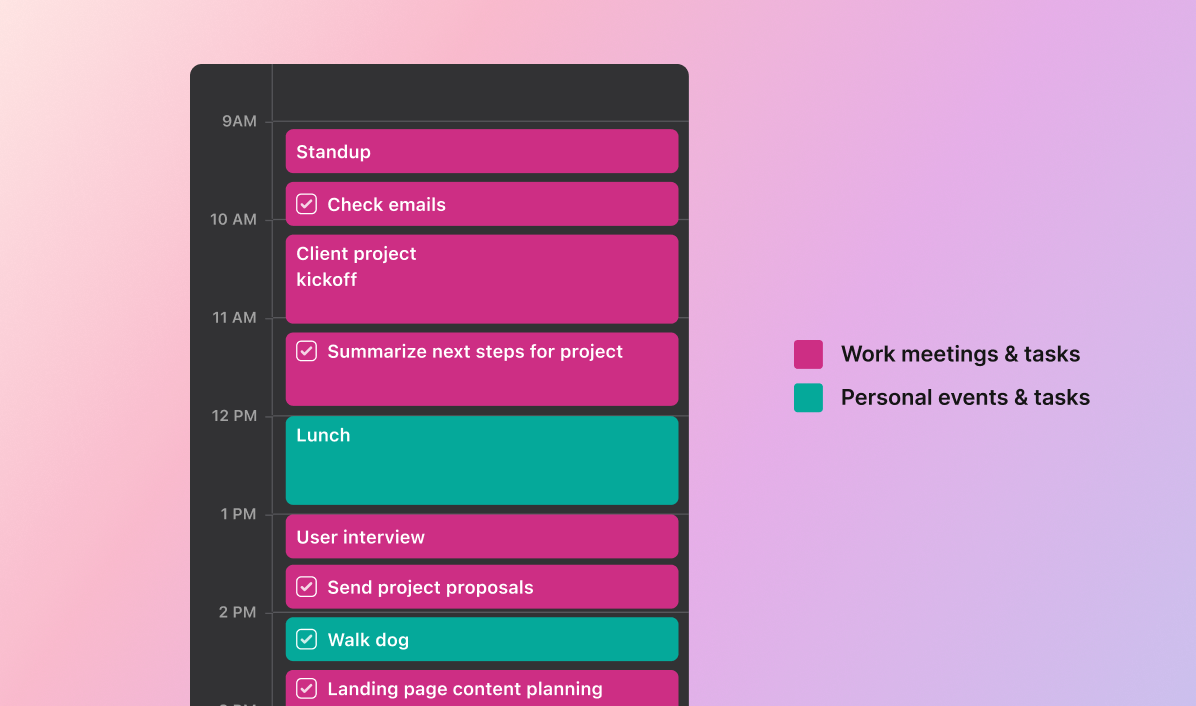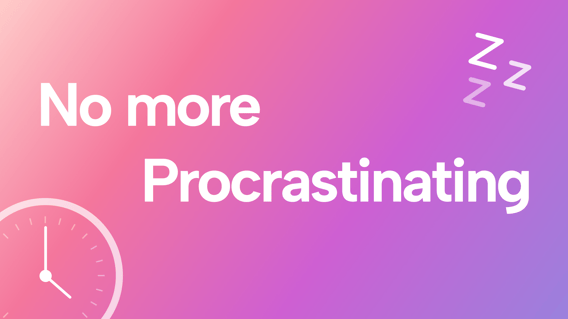Procrastination is such a common, challenging issue that we now have entire courses, books, and products dedicated to preventing it.
A study of 2219 people revealed that around 88% of the workforce tends to procrastinate at least one hour a day.
Procrastination causes productivity loss, but it also impacts our health.
A 2023 study says, “Procrastination is associated with symptoms of depression, anxiety, and stress as well as loneliness and reduced life satisfaction. Procrastination is also associated with prevalent general physical health problems, cardiovascular disease, and unhealthy lifestyle behaviors.”
Procrastinating is insanely common, counterproductive, and damaging. So why do we chronically do it?
Why do we procrastinate?
You might think it’s due to laziness or poor time management, but it’s not.
“It really has nothing to do with time-management,” says APS Fellow Joseph Ferrari, a professor of psychology at DePaul University. “As I tell people, to tell the chronic procrastinator to just do it would be like saying to a clinically depressed person, cheer up.”
Instead, research reveals something else. Procrastination is caused by emotional, neuropsychological, and dopamine issues. Let’s look at each of these.
Theory 1: Poor emotion regulation causes procrastination
“Procrastination is an emotion regulation problem, not a time management problem,” says Dr. Tim Pychyl, professor of psychology and member of the Procrastination Research Group at Carleton University in Ottawa.
Specifically, negative moods associated with a task or aversion to doing a task cause people to procrastinate.
A 2013 study found that procrastination is “the primacy of short-term mood repair … over the longer-term pursuit of intended actions.”
In the short-term, procrastinating relieves negative feelings, which is one reason we procrastinate.
Theory 2: Poor executive function and poor self regulation cause procrastination.
According to Harvard University’s Center on the Developing Child, “Executive function and self-regulation skills are the mental processes that enable us to plan, focus attention, remember instructions, and juggle multiple tasks successfully.”
Studies have found that poor executive function can cause procrastination. Research of 212 students assessed them for procrastination and then signs of poor executive function, like high impulsivity, poor planning and organization, and frequent activity shifting.
The findings?
Procrastinators showed significant associations with poor executive function.
Theory 3: Low dopamine causes procrastination
Cleveland Clinic explains that dopamine, a neurotransmitter made in your brain, makes us feel good.
“It gives you a sense of pleasure. It also gives you the motivation to do something when you’re feeling pleasure … As humans, our brains are hard-wired to seek out behaviors that release dopamine. When you’re doing something pleasurable, your brain releases a large amount of dopamine. You feel good and you seek more of that feeling.”
And a desire for dopamine can play a part in addictive habits that lead us to procrastinate. For instance, if you find yourself checking text messages, emails, or social media instead of doing a task, this could be because these social activities release dopamine in your brain.
A 2017 study explains how dopamine motivates drug and food addiction. Our brains are motivated to seek out dopamine, and when we repeatedly engage in an action that releases dopamine in the brain, we lower our brain’s dopamine response to other incentives and our capacity for top-down regulation.
This can also be applied to other addictive behaviors, like activities we engage in when procrastinating. If these procrastinating activities release dopamine and we frequently engage in procrastination, this may lower our dopamine response to other activities and decrease self regulation, a key part of executive function.
These three theories for why we procrastinate are interrelated, interesting and awareness of them can help us fight procrastination.
But what are some concrete, proven ways we can stop procrastinating?
How to stop procrastinating
Here are 12 research-backed tips to overcome procrastination.
Flip your negative thoughts about a task to positive thoughts.
In college, I studied sports psychology and how self-talk impacts athletic performance. To this day, positive self-talk helps with my athletic performance and my work performance (more on why in a moment).
Self-talk is how you speak to yourself internally. Or, as positivepsychology.com puts it, “Self-talk is generally thought to be a mix of conscious and unconscious beliefs and biases that we hold about ourselves and the world generally.”
For example, when performing a task, you might tell yourself, “This is hard. I don’t want to do this.” That is a form of negative self-talk.
Or, you might tell yourself, “I’m excited to do this task, because I’ll learn and improve, and I’ll get closer to reaching my goals.” This is a form of positive self-talk.
Positive self-talk improves your ability to stick to goals. A 2005 study by Cousins and Gillis found that positive self-talk enhanced exercise adherence.
And it helps you cope with anxiety and negative emotion, a key reason for why we procrastinate. For example, a 2020 Iranian study showed that self-talk affected how people coped with anxiety. People who reported using positive self-talk had less anxiety.
Kendall and Treadwell (2007) also studied how self-talk affects anxiety. “They investigated self-talk as a predictor for anxiety in children with and without a diagnosis of an anxiety disorder. They found that reducing negative self-talk mediated substantial treatment gains in the children with a diagnosis,” says Positive Psychology.
And it boosts confidence and resilience. Those who score highly for optimism and positive self-esteem are more likely to achieve their goals, score good grades, and more. (Lyubormisky, 2008).
To improve your self-talk, observe how you think and speak to yourself when procrastinating on work. You might even want to keep a self-talk journal.
Then, to leverage the power of self-talk to reduce procrastination, turn your negative self-talk around a task to positive self-talk. Here are some examples of how you might do this:

Forgive yourself.
This is another form of self-talk and a 2010 study supports it.
In that study, researchers discovered that students who forgave themselves for procrastinating when studying for an exam ended up procrastinating less for the next exam they studied for.
Here’s how you might turn negative, unforgiving self-talk into positive, forgiving self-talk:

Develop self compassion.
This is yet another form of self-talk.
An excellent New York Times article on procrastination says, “In a 2012 study examining the relationship between stress, self-compassion and procrastination, Dr. Sirois found that procrastinators tend to have high stress and low self-compassion, suggesting that self-compassion provides ‘a buffer against negative reactions to self-relevant events.’”
Here are some examples of uncompassionate vs. compassionate self-talk:
SEE GOOGLE DOC FOR CHART
Be mindful.
A 2014 study found that mindfulness based interventions (MBIs) can improve executive function, a key skill for those wanting to stop procrastinating.
MBIs include body relaxation, breathing practice, mental imagery, and body and mind awareness.
The study, in particular, examines the effectiveness of the IBMT intervention, which “involves body relaxation (e.g., conscious relaxation of muscle sets), mental imagery (e.g., imaging the calm sea), and mindfulness training (e.g., awareness of one’s thought without judgment).”
One study found that IBMT improves task attention, positive emotions, academic performance, and social behavior.
Establish rewards for focused work.
Our brain is motivated by rewards, which release dopamine. Instead of fighting this built-in system, embrace it.
Create a system for yourself that rewards you for focused work.
For example, use the Pomodoro technique, which rewards you with a break after periods of focus.
Related: What is the Pomodoro Technique?
Or, consider other incentives, like:
- A snack or treat
- A gift you buy yourself
- An enjoyable activity
Your reward system should be unique to what motivates you and what is doable in your situation.
Break large, overwhelming tasks into smaller tasks.
Mentally, this is less overwhelming.
For example, instead of “Write 2,000-word blog post,” make your task, “Write 200 words of blog post.”
Melissa Gratias, Ph.D., a workplace productivity coach and speaker, explains why this is effective, “Breaking tasks down helps us to see large tasks as more approachable and doable, and reduces our propensity to procrastinate or defer tasks, because we simply don’t know where to begin.”
Consider only your next action.
This is different from the prior tip.
“According to Dr. Pychyl, focusing only on the “next action” helps calm our nerves, and it allows for what Dr. Pychyl called ‘a layer of self-deception.’” writes Charlotte Lieberman in the New York Times.
Instead of thinking about everything you need to do, think only of the next small action. Instead of “Write a 2,000-word blog post,” think of opening a blank Google doc and putting the blog post title at the top of the page. “Motivation follows action. Get started, and you’ll find your motivation follows,” Dr. Pychyl said.
Create daily to-do lists.
To-do lists focus on specific tasks and can decrease intrusive, stressful thoughts that can distract us and cause procrastination.
Create to-do lists every day. Ideally, create them in the evening for the next day.
Related: The To-Do List Is Dead. There’s a Better Way to Plan Your Day (And It Can Triple Your Productivity)
Use time blocking.
Time blocking is a productivity technique that involves dividing your workday into specific chunks of time dedicated to specific tasks or activities, and then focusing on that task or activity exclusively during that time period, without allowing distractions or interruptions.
Related: Why Traditional Time Blocking Methods Don’t Work
By allocating specific blocks of time for specific tasks, time blocking can help you avoid procrastination and stay focused and productive throughout the day.

Pro tip: Want a tool that will automatically and intelligently time block for you using AI? Try Motion free for 7 days.
Avoid context switching.
Context switching is when you shift your focus from one task to another.
According to a study by the American Psychological Association, switching between tasks can cost you as much as 40% of your productive time.
Context switching hurts productivity, and it’s often just an excuse to procrastinate on your highest-priority task.
Take email for example. Office workers commonly take breaks from focused work to check their email.
This interruption may seem innocuous, but a study by the University of California, Irvine found that it takes an average of 23 minutes and 15 seconds to regain focus after being interrupted.
To avoid this procrastination, switch contexts less frequently and purposefully.
Remove environmental distractions.
Create a working environment that makes it difficult to procrastinate.
To do this, observe what objects, actions, or tasks commonly cause you to procrastinate on what you’re really supposed to be doing. Then, remove access to those distractions.
For example, here are a few distractions that commonly cause me to procrastinate and how I remove access to them while I’m working:
- My phone: I keep it out of my office.
- Email: I turn off email notifications on my computer, close all email browser windows, and block a specific time on my calendar for checking emails.
- LinkedIn: I use an app that blocks LinkedIn during periods of focused work.
Get an accountability partner.
Accountability can be a powerful tool for overcoming procrastination. Here are a few studies that have explored the relationship between accountability and procrastination:
- In a study published in the Journal of Applied Psychology, researchers found that accountability can help reduce procrastination among employees. The study found that when employees were held accountable for their work, they were less likely to engage in procrastination behavior.
- A study published in the Journal of Behavioral and Experimental Economics found that public commitment, which involves publicly announcing your intentions and goals, can help reduce procrastination. The study found that individuals who publicly committed to completing a task were more likely to complete it on time than those who did not make a public commitment.
- Another study published in the Journal of Organizational Behavior found that accountability can help reduce procrastination and improve task performance among college students. The study found that when students were held accountable for their academic work, they were less likely to procrastinate and performed better on their assignments.
Your accountability partner could be a boss, coworker, mentor, or friend.
It could even be a stranger. I use a service called Focusmate, which pairs you with a partner (who is a stranger) for a virtual working meeting. You and your partner share what you’re working on during the session and hold each other accountable to focusing on and doing that work.
Related: 22 Tools Productive People Use to Finish Work Faster, Reach Their Goals, and Reduce Stress
Want a tool that uses AI to help you stop procrastinating?
It automatically and intelligently creates a daily to-do list for you (or your entire work team) and builds a time-blocked schedule for completing that work.





